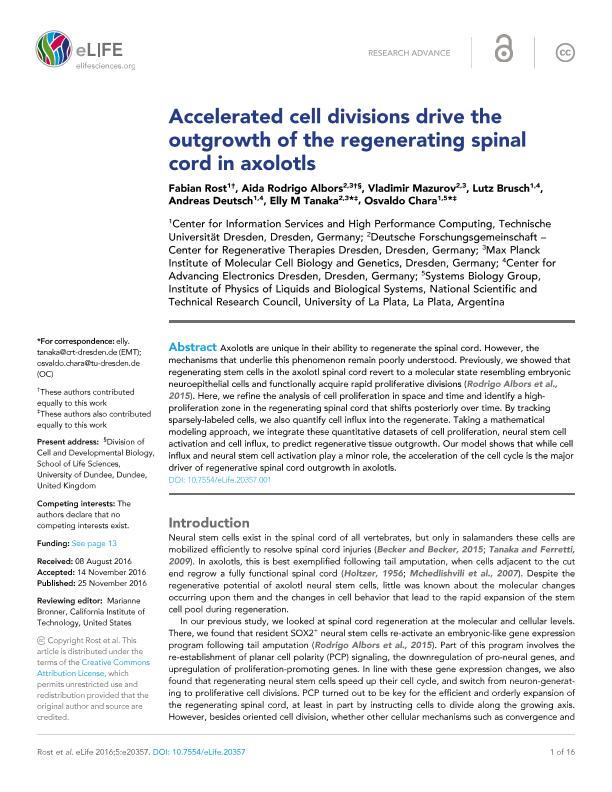Mostrar el registro sencillo del ítem
dc.contributor.author
Rost, Fabian
dc.contributor.author
Rodrigo Albors, Aida
dc.contributor.author
Mazurov, Vladimir
dc.contributor.author
Brusch, Lutz
dc.contributor.author
Deutsch, Andreas
dc.contributor.author
Tanaka, Elly M
dc.contributor.author
Chara, Osvaldo

dc.date.available
2018-06-12T14:15:37Z
dc.date.issued
2016-11
dc.identifier.citation
Rost, Fabian; Rodrigo Albors, Aida; Mazurov, Vladimir; Brusch, Lutz; Deutsch, Andreas; et al.; Accelerated cell divisions drive the outgrowth of the regenerating spinal cord in axolotls; eLife; eLife; 5; 11-2016; 1-16
dc.identifier.issn
2050-084X
dc.identifier.uri
http://hdl.handle.net/11336/48245
dc.description.abstract
Axolotls are unique in their ability to regenerate the spinal cord. However, the mechanisms that underlie this phenomenon remain poorly understood. Previously, we showed that regenerating stem cells in the axolotl spinal cord revert to a molecular state resembling embryonic neuroepithelial cells and functionally acquire rapid proliferative divisions (Rodrigo Albors et al., 2015). Here, we refine the analysis of cell proliferation in space and time and identify a highproliferation zone in the regenerating spinal cord that shifts posteriorly over time. By tracking sparsely-labeled cells, we also quantify cell influx into the regenerate. Taking a mathematical modeling approach, we integrate these quantitative datasets of cell proliferation, neural stem cell activation and cell influx, to predict regenerative tissue outgrowth. Our model shows that while cell influx and neural stem cell activation play a minor role, the acceleration of the cell cycle is the major driver of regenerative spinal cord outgrowth in axolotls.
dc.format
application/pdf
dc.language.iso
eng
dc.publisher
eLife
dc.rights
info:eu-repo/semantics/openAccess
dc.rights.uri
https://creativecommons.org/licenses/by-nc-sa/2.5/ar/
dc.subject
Regeneration
dc.subject
Axolotl
dc.subject
Mathematical Modeling
dc.subject
Spinal Cord
dc.subject.classification
Otras Ciencias Biológicas

dc.subject.classification
Ciencias Biológicas

dc.subject.classification
CIENCIAS NATURALES Y EXACTAS

dc.title
Accelerated cell divisions drive the outgrowth of the regenerating spinal cord in axolotls
dc.type
info:eu-repo/semantics/article
dc.type
info:ar-repo/semantics/artículo
dc.type
info:eu-repo/semantics/publishedVersion
dc.date.updated
2018-06-08T14:25:54Z
dc.journal.volume
5
dc.journal.pagination
1-16
dc.journal.pais
Reino Unido

dc.journal.ciudad
Cambridge
dc.description.fil
Fil: Rost, Fabian. Technische Universitat Dresden; Alemania
dc.description.fil
Fil: Rodrigo Albors, Aida. Center for Regenerative Therapies Dresden; Alemania. Max Planck Institute of Molecular Cell Biology and Genetics; Alemania
dc.description.fil
Fil: Mazurov, Vladimir. Center for Regenerative Therapies Dresden; Alemania. Max Planck Institute of Molecular Cell Biology and Genetics; Alemania
dc.description.fil
Fil: Brusch, Lutz. Technische Universitat Dresden; Alemania
dc.description.fil
Fil: Deutsch, Andreas. Technische Universitat Dresden; Alemania
dc.description.fil
Fil: Tanaka, Elly M. Center for Regenerative Therapies Dresden; Alemania. Max Planck Institute of Molecular Cell Biology and Genetics; Alemania
dc.description.fil
Fil: Chara, Osvaldo. Consejo Nacional de Investigaciones Científicas y Técnicas. Centro Científico Tecnológico Conicet - La Plata. Instituto de Física de Líquidos y Sistemas Biológicos. Universidad Nacional de La Plata. Facultad de Ciencias Exactas. Instituto de Física de Líquidos y Sistemas Biológicos; Argentina. Technische Universitat Dresden; Alemania
dc.journal.title
eLife
dc.relation.alternativeid
info:eu-repo/semantics/altIdentifier/doi/https://dx.doi.org/10.7554/eLife.20357
dc.relation.alternativeid
info:eu-repo/semantics/altIdentifier/url/https://elifesciences.org/articles/20357
Archivos asociados
